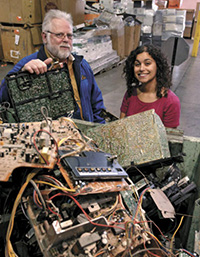Growing by GREENetworking
by Emma Ritch, San Jose Business Journal
 |
 |
 |
 |
| |
 |
|
| |
ASL Recycling Vice Presidents Bill McGeever and Carey Levine are exploring ways to make it easier for people to dispose of
their e-waste.
©Dennis G. Hendricks |
|
 |
 |
 |
|
| |
21 December 2007 (Silicon Valley) – ASL Recycling is urging consumers to find their "greenspot."
The San Jose company is trying to make it easier for people to dispose of e-waste -- such as computers, televisions, fax machines and phones -- for environmental reasons and to comply with state laws prohibiting certain materials from entering landfills.
ASL has found a way to make money in the venture by capitalizing on state rebates to recyclers and by disassembling products and selling off scrap metal and plastic. ASL is launching a new program in January called the GREENetwork that will establish drop zones throughout Northern California and eventually the state. They'll pay the collector-sites a cut of the profits, and the GREENetwork can save businesses money because drop-off is free at those locations and at ASL's facility on Brennan Street in San Jose.
ASL began accepting e-waste after state legislation prohibited computer monitors and televisions from going into landfills starting in 2005. The state pays ASL and other recycling companies 48 cents a pound for the computer monitors and televisions from the advance-recovery fee fund, which consumers pay into when buying new electronics.
According to the Environmental Protection Agency, there were 1.9 to 2.2 million tons of disposed electronics in the U.S. in 2005. Of that, 1.5 to 1.9 million tons were sent to landfills, and 345,000 to 379,000 tons were recycled.
The state-regulated recycling, which brought in 600,000 units in three years at the company, is ASL's biggest revenue stream, but ASL has also managed to find smelters and companies willing to buy the copper wiring, metal and plastics that go into other, unregulated e-waste, such as copiers, scanners and cell phones.
ASL is able to recycle 98 percent of the material that comes into its 115,000-square-foot facility, or about 1 million pounds a month. It also sells 400,000 pounds a month of scrap products and has the capacity to double the amount it processes, says Carey Levine, ASL's vice president of sales and marketing.
Some of the unregulated e-waste has scrap values high enough to warrant dismantling, others don't. But the company accepts all of it at no cost because it wants to encourage more people to bring e-waste to its facility because of the overall economic benefit, says Bill McGeever, the company's vice president.
ASL has seen business steadily increase in its three years of accepting e-waste, from 6 million pounds of state-regulated materials in 2005 to 9 million in 2006 and 12 million in 2007, McGeever says.
There are about 60 recyclers in the state, with about six of significant competition to ASL, McGeever says.
E-waste recycling is a growing business across the world as consumers upgrade electronics more quickly and cheaply, and that's encouraging some unscrupulous companies to accept the e-waste and dump it in developing countries.
"There are however a growing number of responsible companies in the U.S. who are trying to figure out the right thing to do. It's challenging to figure out because the federal government and state governments have not caught up to monitoring this waste stream," says Sarah Westervelt, the e-waste project coordinator for watchdog group the Basel Action Network.
"What the responsible companies have found is that if they get high enough volumes they can make this work without dumping waste," she says. "In California it's a whole different universe because of the laws passed to create a funding mechanism for the collection and recycling of e-waste, and that law has created false economy around this waste stream and is designed to keep the toxins out of the landfills."
Basel hasn't audited the ASL facility, but Westervelt says an initial look at the companies that take ASl's recycled materials looks positive.
ASL's clients include Sony, Nokia, Wal-Mart and the University of California.
McGeever says creating awareness is the biggest obstacle for companies such as ASL because many Californians don't realize that the upfront disposal fee entitles consumers to dispose of e-waste at no cost.
ASL works with 20 to 30 vendors but is looking for more to host "greenspots" as part of the GREENetwork.
The privately held company expects the program to help maintain the 50 percent growth rate each year in Northern California. In the first quarter of 2008, ASL wants to expand to Southern California.
The company employs about 70 people but would increase its staff to 100 if it begins to use the facility at full capacity.
The company is profitable, although officials wouldn't release revenue data, and wants to expand its GREENetwork to other states.
The problem is that California is the only state to reimburse e-waste recyclers, but other states, including Oregon and Texas, are looking at programs to either charge manufacturers or consumers upfront.
ASL wants to establish agreements with companies and relationships with customers before any regulations go into effect, Levine says.
"We see opportunities outside California," she says. "But we want to succeed here first."
FAIR USE NOTICE. This document contains copyrighted material whose use has not been specifically authorized by the copyright owner. The Basel Action Network is making this article available in our efforts to advance understanding of ecological sustainability and environmental justice issues. We believe that this constitutes a 'fair use' of the copyrighted material as provided for in section 107 of the US Copyright Law. If you wish to use this copyrighted material for purposes of your own that go beyond 'fair use', you must obtain permission from the copyright owner.
More News
|